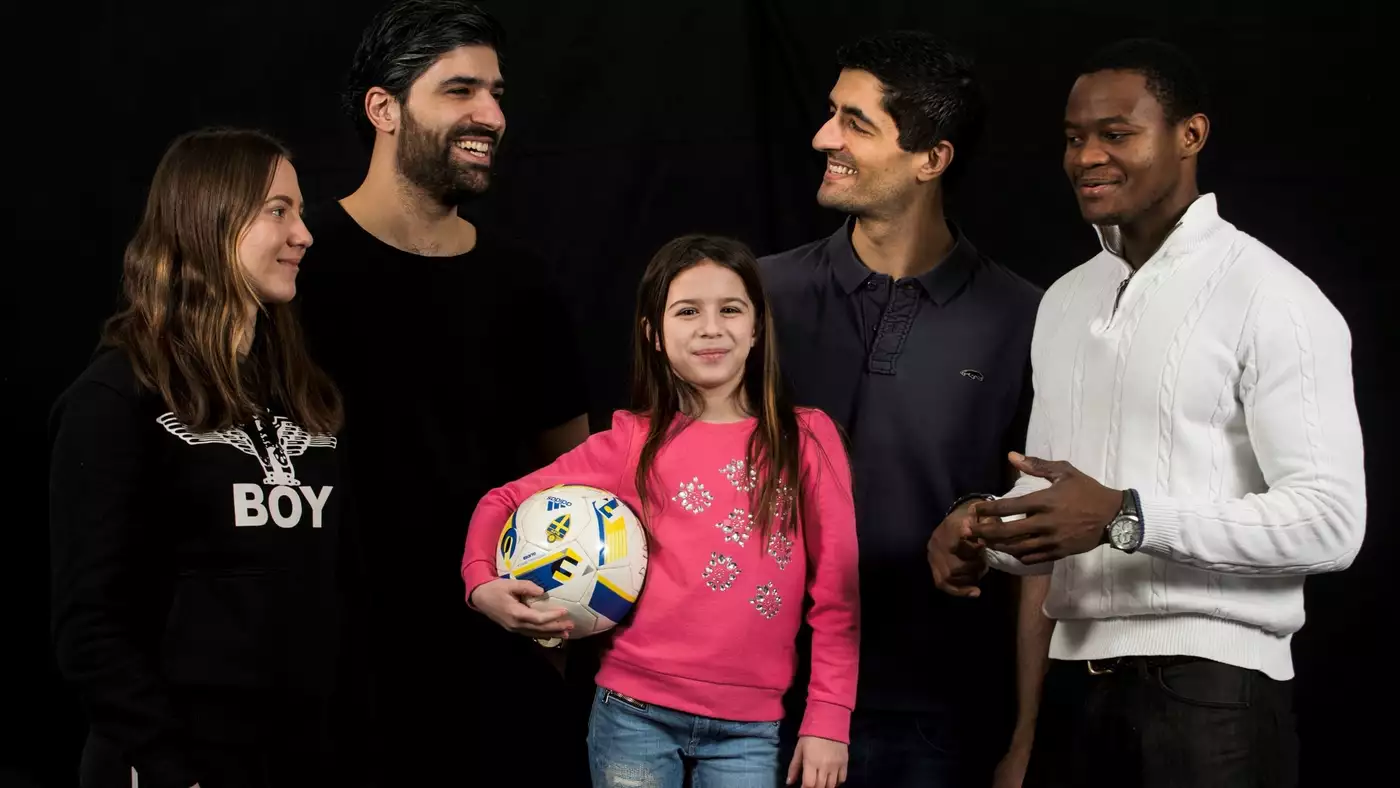Laget – A Fictional Radio Drama

Laget is a Swedish fictional radio drama about sisterhood, migration, and football. It aired on Radio Sweden (Sveriges Radio) and was written and directed by Milad and Misagh Alami.
The 27 minutes piece, which premiered on 3rd of March 2017, quickly became one of the most frequently shared radio dramas released that year.
The story follows Larisa and her sister Tea as they build a football team in an accommodation for asylum seekers who are children. The marches are won, but the players become fewer and fewer. Rejections and appeals descend like a threatening shadow over the pitch. Larisa fights against all odds, for the team and to take power over her own future.
The creative process
Laget is a story featuring an adolescent making a forced leap from a child to a desperate situation of an adult. Someone who is actively dealing with trauma, and someone who is certainly no normal figure of the world. Larisa, the 16 year-old young strong as a rock lead, kicks off the radio drama with:
LARISA
Who’s new here?
Instantly highlighting how they are in a space where people float through and no one stays for long. To deal with this harsh reality, and to find a meaning with a lack of meaningful relationships, they form their own football team.
Being alone as children in a foreign country, the football team became their immediate family.
With the responsibility of taking care of her younger sister Tea, and finding a way for them to stay in Sweden, the writers Milad and Misagh want to contrast Larisa’s responsibilities with that of any innocent child’s desires.
Larisa meets Emmanuel, a new refugee who just moved into their home.
EMMANUEL
Why do you have short hair?
LARISA
Why do you care?
EMMANUEL
Is it because you wanna look like a boy?
LARISA
Drop it.
EMMANUEL
I’m just curious.
LARISA
I cut my hair before I came here. I’ve had short hair ever since.
EMMANUEL
Why? Do girls have short hair in Kosovo?
LARISA
No.
Larisa laughs.
LARISA (CONT’D)
It was better if they thought I’m a boy.
EMMANUEL
What? Do you wear boy clothes as well?
LARISA
Yes.
EMMANUEL
Did they believe you?
LARISA
Yes. I wasn’t raped.
Emmanuel does not know how to react. Larisa’s answer became too serious. Emmanuel changes the subject.
EMMANUEL
Why do you care so much about football?
Having a strong sense of identity is about understanding how you are valued and worthy of attention. Children and teens with a strong sense of identity are open to new challenges, asking questions, and trying new things. Larisa has this self-identity, who she believes herself to be.

But the experience of growing up in a suppressed society has contributed to Larisa being close to her emotions, and hiding them to not make herself vulnerable. Emmanuel is the exception who breaks this barrier and allows us to learn about Larisa’s inner self in the same pace as he does.
EMMANUEL
Hey.
Larisa gets scared. She drops the glass on the floor. It breaks into pieces.
EMMANUEL (CONT’D)
Oh, sorry!
LARISA
You scared me.
We hear how Larisa and Emmanuel pick up the glass pieces on the floor.
EMMANUEL
You’re easily frightened.
LARISA
Give me the dustbin.
Larisa brushes the broken glass off the floor.
EMMANUEL
What happened?
LARISA
Nothing.
EMMANUEL
Why is your hand shaking?
LARISA
It’s not shaking.
EMMANUEL
Listen.
Emmanuel grabs Larisa’s hands.
LARISA
Don’t touch me.
EMMANUEL
Sorry.
LARISA
I don’t need your help.
EMMANUEL
Ok.
LARISA
Why are you so sticky?
EMMANUEL
What does this mean. “Sticky”?
Larisa’s relationship with her sister Tea contrasts that of a child becoming the caregiver to their young sibling. They also have a strong sense of sisterhood, which at its most basic level works as an emotional connection in how they give and receive the emotional support needed to pull through their journey.

Such support means you are being seen, heard, and understood. This is particularly highlighted not only in Larisa’s approach of being present to her younger sister, but also how Tea recognises Larisa’s absence.
It is night. We hear Tea snoring. Larisa is laying beside her. She turns around all the time. Tea wakes up.
TEA
Stop turning around.
LARISA
Sorry.
TEA
Can’t you sleep?
LARISA
No.
TEA
Did you have a bad dream?
LARISA
Go to sleep. I didn’t dream something bad.
A moment of silence. Tea can’t go back to sleep.
TEA
What are you thinking about?
LARISA
Nothing.
TEA
Are you thinking about Emmanuel?
LARISA
What?
TEA
Yeah you’re thinking about him!
LARISA
Stop being silly!
TEA
Do you love him?
LARISA
No.
TEA
Yes you do! Have you kissed?
LARISA
No, we have not kissed!
TEA
He wants to kiss you.
Tea laughs.
LARISA
How do you know that?
TEA
He looks at you all the time.
LARISA
Does he?
TEA
Yup. Are you going to marry?
LARISA
No, we are not going to get married?
TEA
Yes! You are getting married!
Tea laughs. Larisa can’t resist to laugh as well.
Working with child actors can be a rewarding process if you approach it appropriately. Generally, they are excited to be on set, where they come prepared with a positive attitude. And if you made good choices during the casting process, your young cast will have a natural way of working with your material.
This was the case with the girls playing Larisa and Tea. Both of them, who were amateurs like the rest of the main cast, had a natural sense of presence while delivering the lines and taking direction, very similar to adult actors.
Larisa and Emmanuel’s relationship is further established in an unaired extra scene where they together wander around the area and absorb the culture. They blend in with their surroundings, weaving their identities into the spaces they inhabit.
The dialogue about culture is particularly fascinating, both because of its relatable content, but also because of what it said about the characters and their relationships to the world around them.
We are outside. The sound of cars can be heard from far away. Larisa is walking on a street. Emmanuel runs up to her.
EMMANUEL
What are you up to?
LARISA
Just walking.
EMMANUEL
Can I join?
LARISA
If you want.
They walk in silence. Suddenly we hear the ice cream truck bell.
LARISA (CONT’D)
Did you bring your phone?
EMMANUEL
Who are you going to call?
LARISA
I forgot to bring mine. Can you take a picture of that ice cream truck?
EMMANUEL
Okay.
Emmanuel takes a photo of the ice cream truck. We hear the melody as it drives away.
LARISA
Can you send me that later?
EMMANUEL
Why?
LARISA
It never drives where we live. Tea said she saw a car that sells ice cream. I thought she was dreaming.
EMMANUEL
Have you never seen one?
LARISA
They don’t have it in our country.
Larisa laughs lightly.
EMMANUEL
Wanna buy an ice cream for her?
LARISA
Let’s do it when we go back.
EMMANUEL
Okay. You’re not much outside, are you?
LARISA
Yes I am. I have seen a lot.
EMMANUEL
Like what?
LARISA
Do you see that restaurant?
EMMANUEL
Yea.
LARISA
You can buy the tastiest “palt” there.
EMMANUEL
That messy mess with pork in it?
LARISA
It’s so good.
EMMANUEL makes a sound of disgust with his mouth.
EMMANUEL
What else have you seen?
LARISA
You see that?
EMMANUEL
The cafe?
LARISA
No, next to it.
EMMANUEL
The parking?
LARISA
The small hill in between.
EMMANUEL
Yeah.
LARISA
In midsummer, we all gather and walk the path down to the river. There they put up the maypole.
EMMANUEL
What do you do with that?
LARISA
Dance and sing. You would love it.
EMMANUEL
I can’t dance. Or sing.
LARISA
We can go there together.
A moment of silence between Larisa and Emmanuel while they wander down the street.
EMMANUEL
What else have you seen?
LARISA
Let’s see… right now I see the stench of your perfume!
EMMANUEL
Funny.
LARISA laughs out loud. Emmanuel isn’t as amused.
The radio drama concludes ambiguously with Larisa and Tea attempting to escape from their inevitable faith, with one final tense but bittersweet interaction between Larisa and Emmanuel.
Reflecting back on Laget, maybe the idea of the relationship between Larisa and Emmanuel was there to provide the notion of hope.
We are outside. Some distance away, the cheers are heard from the football game. Larisa and Tea are standing outside the dressing room.
LARISA
We’re going that way.
TEA
But what about the game?
LARISA
They’ll continue without us.
TEA
Do we have to leave?
LARISA
Yes, come now.
We hear Larisa and Tea move away from the sound of cheering, and their teammates and friends. They are rushing.
Suddenly we hear someone running up to them. It is Emmanuel.
EMMANUEL
The game starts soon.
LARISA
Go back to the others.
EMMANUEL
Where are you going?
LARISA
Away.
EMMANUEL
What do you mean, away?
LARISA
Just away.
A moment of silence.
LARISA (CONT’D)
Can you take care of the team?
Emmanuel has a hard time finding his words. Suddenly he says:
EMMANUEL
I like you.
LARISA
Just answer. Will you take care of the team?
EMMANUEL
I will do my best.
LARISA
Good.
Larisa and Emmanuel stand next to each other and breathe out. They don’t know what to say.
LARISA (CONT’D)
You said I look like a boy.
EMMANUEL
No I didn’t.
LARISA
What. Does boys turn you on?
EMMANUEL
What does that mean, “turn”?
LARISA
Do you like boys?
EMMANUEL
Yes. Or no! Not like that!
Tea laughs.
EMMANUEL (CONT’D)
You are weird.
LARISA
How?
EMMANUEL
You say things without thinking about what other people will say back.
LARISA
Don’t you?
EMMANUEL
I think a bit before speaking.
LARISA
I think too. I just dare to say what I think about.
EMMANUEL
So do I.
LARISA
What are you thinking about now?
EMMANUEL
You.
LARISA
What are you thinking about then?
EMMANUEL
That I like your short hair.
Larisa gives him a kiss.
LARISA
I like yours too.
Then Larisa and Tea walk away.
We hear how they walk quicker. The sound of the football game disappear behind them.
LARISA
It is now we need to run Tea. Really, really quick.
We hear them run further away. And just like that, they are gone. As if they were never there in the first place.
Team
Directed and written by:
Milad Alami
Misagh Alami
Producer:
Camilla Blomqvist
Sound:
Calle Andersson
Glate Öhman
Sound design:
Glate Öhman
Animation:
Vika Burlakina
Cast:
Larisa – Larisa Lagumdzic
Tea – Tea Golubovic
Emmanuel – Emmanuel Kunda
Woman employee – Maja Runeberg
Azar – Azarakhsh Pedram
Girl – Jasmine Pedram
Others – Chloé Kunda, Claudine Kunda, Sarah Kunda
Young woman – Isabella Karim.
Children in the football team:
Anahit Avetisyan, Shogik Grigoryan, Geram Grigoryan, Philip Mhenni, Sow Ae, Samuel Barseghyan, and others.
Featured image:
Magnus Stenberg
Featuring music by:
Johann Johannsson – The Candlelight Vigil
The Chemical Brothers – Hanna’s Theme
Oh Wonder – Technicolour Beat
Leyla Mccalla – Little Sparrow
William Basinski – Water Music 2